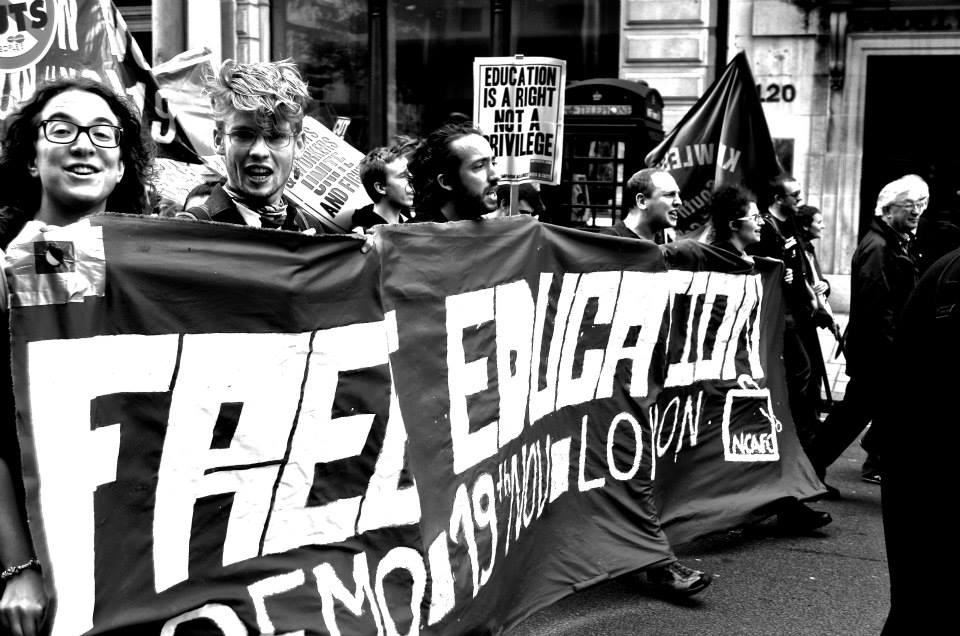The fight for free education: Why next week's national student demonstration is so vital
National Campaign Against Fees and Cuts is mobilising students on 19 November

At first sight, the national demonstration for free education on 19 November might look like a lost cause. For over a decade, there has been a consensus among Britain’s political elite on education funding. We are told by politicians every day that there is no money for anything - including colleges and universities - and that rocketing tuition fees are an unavoidable evil. We are simultaneously told that access to education is on the top of every government’s agenda.
This consensus is wrong. There is enough money in society to pay for education. According to the Office for National Statistics, the top 10 per cent of British society owns 44 per cent of the wealth. There are ample resources to fund a public education system, not to mention other public services - if only the political establishment had either the willingness or the guts to raise taxes on the rich and tackle tax avoidance of multibillion-pound cooperations. What’s more, the vast majority of the population would agree with such a policy: 96 per cent of the British public favour a more progressive taxation system, according to the Equality Trust, and when asked, a clear majority has always opposed the introduction of tuition fees and every subsequent increase.
There is currently a chronic lack of political will among mainstream politicians to back a system of progressive taxation to fund public services such as education. These people have a completely different idea to us about how society should be run in general, and about the purpose of education specifically. Over the past four years, the Coalition has put forward policies that have turned universities into businesses: in 2013 alone, the number of private providers in HE tripled, and privatisation and outsourcing are growing everywhere.
Most dramatic is how much we pay, and how much university funding is now reliant on international students shelling out vast sums of money. Unless you are top of your year, have rich parents, or are willing to take on commercial debt, doing a postgraduate degree is now a distant prospect. Meanwhile, the number of part-time undergraduates has halved since 2010. It is not an exaggeration to say that the privatisation of higher education is forcing people out of education - and that is before we begin to consider the cutting of Education Maintenance Allowance (EMA), a lifeline for working class school and FE students to continue further study until it was cut in 2011.
The political elite have a different set of interests and ideals to most students and ordinary people, and that is why simply knocking on their door and asking nicely for piecemeal improvements will not work. We will have to force politicians to act by being loud, and by taking to the streets - and we will have to do so on the basis of a positive vision for education. On 19 November, we will be marching for an education system which is a public service, free for everyone, funded by taxing the rich - and democratically run by students and education workers.
Student movements in other countries have shown us time and time again that this is the way forward. Germany is just the latest example of a country in which students have won free education through mass protest. So we need to mobilise and keep mobilising. Following the November demonstration, there will be two more days of action - one on 3 December aimed at occupations and walkouts in universities and schools, and one on 6 December, which will consist of a series of marches in local towns, drawing in support from the wider community.
The most important step in building a movement that is capable of winning is creating a sustainable organising model from a grassroots level, nationally and locally. The core of this model are the local activist groups which organise on campuses against exploitation and privatisation. But just as important is the ability to have a national voice. The National Campaign Against Fees and Cuts has existed since 2010, and is coordinating much of the protest action this autumn. If you share the belief that education should be free, you should get involved in the movement to fight for it.
For more information on the national demonstration, click here
Subscribe to Independent Premium to bookmark this article
Want to bookmark your favourite articles and stories to read or reference later? Start your Independent Premium subscription today.

Join our commenting forum
Join thought-provoking conversations, follow other Independent readers and see their replies